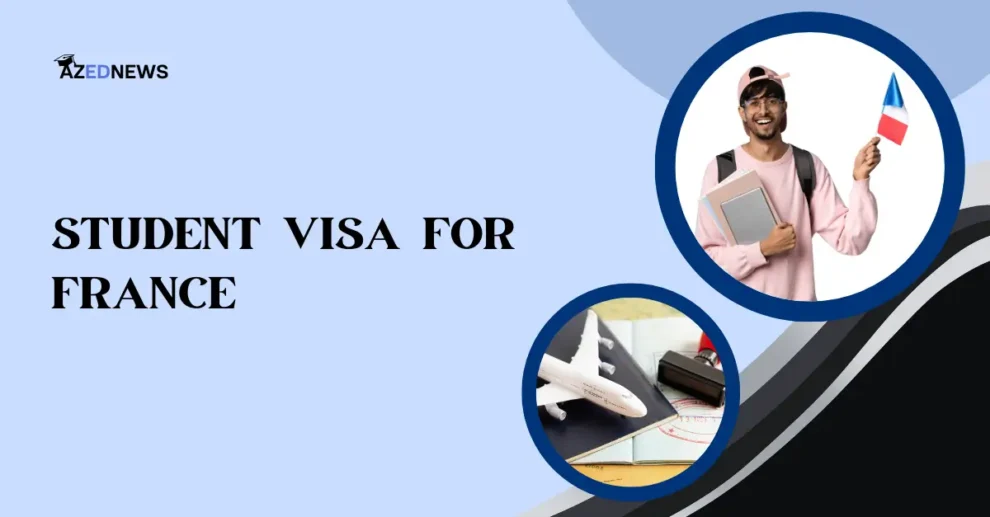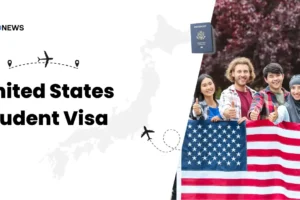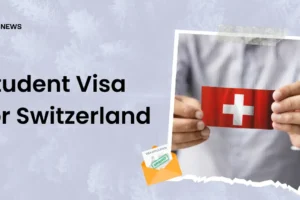If you are thinking about studying in France for more than three months, you will need a student visa for France. It is like a special permission slip that lets you stay and study in France. Sometimes, it even lets you work a bit each week.
Table of Contents
In this article, we will talk about some important stuff you should know if you want to keep studying in France. So, let’s get started.
Key Takeaways
- Types of French Student Visas:
- Schengen short-stay visa: For studies under three months.
- Temporary long-stay visa: For courses lasting 3 to 6 months.
- Long-stay visa for students (VLS-TS étudiant): For studies over a year.
- Show €615 per month for living expenses.
- The visa fee is €99 for master’s degree applicants. An additional processing fee of €50 may apply.
- Language Requirements: Proficiency in French or English. Language tests like DELF/DALF, TCF for French, or PTE Academic, IELTS, TOEFL, Duolingo, and C1 Advanced for English may be required.
- Convert a long-stay visa to a residence permit within three months of arrival.
- Common Interview Questions: Personal background, interests, and future goals. Reasons for studying in France and choice of university. Financial support for studies.
- Obtain Carte de Séjour if staying longer than a year.
- Working as a Student in France allowed up to 964 hours per year (or 50% for Algerian students). Paid minimum wage is currently €1,480.27.
- Common Reasons for Visa Rejection: Insufficient funds, fake documents, poor academic performance. Lack of knowledge about chosen course or institution.
- Appeal within two months to the French embassy or consulate. Provide necessary documents and submit appeals in French.
What Are The Types of French Student Visa?
If you want to study in France, there are different types of visas you might need. This depends on how long you will be studying.
- First, there is the Schengen short-stay student visa. It is for studies that last less than three months, like short courses or language programs.
- Then, there is the temporary long-stay visa. This one is for courses that take between 3 to 6 months to finish.
- Finally, there is the long-stay visa for students. It is also called VLS-TS étudiant. This visa is for students who will be studying for more than a year. This includes students doing a two-year master’s degree or an MBA course. You might also need to apply for a multi-annual resident permit to stay longer than one year.
What Are The Documents Required For Student Visa for France?
When you apply for your visa to study in France, you will need to gather some important documents.
- First, you will need a passport photo and your valid passport.
- You will also need an acceptance letter from the university where you will be studying, along with an EEF Admission Certificate and an EEF number.
- Make sure you have proof of where you will be staying in France, whether it is a rent agreement or a hotel reservation.
- You will also need to show that you have enough money to support yourself during your stay. This means you should have about €615 per month.
- Do not forget to get medical insurance that works in France and bring proof of it.
- Lastly, fill out the visa application form and make sure you have the receipt for the application fee you paid.
What Are The Financial Requirements For France Student Visa?
When you are proving you have enough money to live in France, you will need to show you have about €615 per month.
You can do this by providing a bank statement or a letter from someone assuring they will support you financially.
If you are using a bank statement, make sure it covers three months and shows enough money for your first year of study.
If you have more than one person supporting you, each one needs to write a letter saying they will help, and provide their bank statements and tax returns.
If you are getting a scholarship, you will need a letter from the organization saying how much and how long you will get it.
Cost of Student Visa for France
If you are applying for a visa to study for a master’s degree, you will need to pay a fee of €99.
You might also have to pay an extra charge of €50 for processing the visa. Depending on where you are, you can pay this by cash or bank transfer.
When and Where To Apply For The French Student Visa?
If you want to get a student visa for France, you have two options: you can either go to a French consulate in your country or go through Campus France, which helps students from all over the world.
Some countries need you to register with Campus France before getting a student visa. Here is what you need to do:
- First, schedule an interview or appointment on the official website of the French consulate in your area.
- Check the online calendar to see when there are available dates and times.
- Try to set your appointment at least 90 days before you plan to go to France.
- Next, pay the visa processing fee. It can be between 50 and 100 euros, depending on where you are from.
- Then, wait for your visa. The time it takes to process depends on your nationality and how many other students are applying. The earlier you start the application, the better.
What Are The Language Requirements for Studying in France?
When you apply to a university in France, you need to show that you can speak French or English.
If you are applying for a course in French, you will need to prove you know French by taking a test like DELF/DALF or TCF.
If you are applying for an English course, you will need to show you know English by taking a test like PTE Academic, IELTS Academic, TOEFL iBT, Duolingo, or C1 Advanced.
If you already have a letter saying you got accepted into a French university, you do not need to do any more language tests for your visa.
How Do You Validate Your France Student Visa?
When you get to France, you will need to make sure your long-stay visa becomes a residence permit. You have to do this within your first three months there. It is easy to do online. You will need:
- An email address
- Info about your visa
- The date you arrived in France
- Your address in France
- A bank card to pay the fee online for getting your residence permit.
What Are The Common Interview Questions For a French Student Visa?
In your student visa interview for France, they might ask:
- About yourself: your school, hobbies, what you want to do in the future.
- Why do you want to study in France?
- Why did you pick a French university?
- Why did you choose your course?
- What are your goals?
- Where your money for studying comes from.
Residence permit in France
When you first come to France for your studies, you will get a long-term student visa. Within a month, you will need to go to the local French Office of Immigration and Integration (OFII) for a medical check-up.
During your first year, this visa shows you are allowed to stay in France. But if you plan to stay longer than a year, like for your second year of studies, you will need to apply for an official residence permit called a Carte de Séjour (CDS).
Can You Work in France as a Student?
In France, if you are a foreign student, you can work for up to 964 hours a year. That is about 60% of the regular working hours in France. But if you are from Algeria, you can only work up to 50% of the regular hours.
When you work, you will get paid at least the minimum wage in France, which is 1,480.27. If you are paid minimum wage, you will get 60% of that amount.
What Are The Common Reasons for Rejection of a French student visa?
Here are some common reasons why your visa application might be rejected:
- Not enough money
- Wrong or fake papers
- Not doing well enough in school
- Not knowing enough about the course or school you picked
- A chance that you might cause trouble
- Not being good at talking in interviews
What Can You Do in Case of Visa Refusal?
If your French student visa application is turned down, you can ask for it to be looked at again by the French embassy or consulate where you applied. You should do this if you think the refusal was not fair.
You have to send your appeal in French and include any important papers within 2 months from when you were refused. The result could be that they still don’t answer in 2 months, or they say no again.
Student Visa for France Summary
| Criteria | Description |
| Types | 1. Schengen Short-stay (<3 months) 2. Temporary Long-stay (3-6 months) 3. Long-stay (>1 year) |
| Documents | Passport, Photo, Acceptance Letter (EEF & EEF Number), Proof of Accommodation, Financial Proof (€615/month), Medical Insurance, Visa Application Form, Fee Payment Receipt |
| Financial Requirements | €615/month (bank statement/sponsor letter) |
| Cost | €99 + potential €50 processing fee |
| Application Process | Embassy/Consulate or Campus France<br> 1. Schedule interview (90 days before travel)<br> 2. Pay processing fee |
| Language | French (DELF/DALF/TCF) or English (PTE/IELTS/TOEFL/Duolingo/C1 Advanced) if the program is taught in that language |
| Validation | Online within 3 months of arrival: email, visa info, arrival date, French address, bank card |
| Residence Permit | Apply within 1 year for Carte de Séjour (CDS) |
| Work Permit | Up to 964 hours/year (60% of regular hours, except Algerian students limited to 50%) |
| Common Rejection Reasons | Insufficient funds, wrong/fake documents, poor academic performance, lack of program/school knowledge, security concerns, interview communication, etc. |
Frequently Asked Questions
1. Is a French student visa easy to get?
After you submit your study visa application for France, it usually takes around 14-21 days to get it. Sometimes, it might take up to 2 months. This depends on where you applied and how your application is.
2. How much money do you need for a student visa in France?
When you are getting ready to study in France, you need to make sure you have enough money in your bank account. You will need to have money for your tuition fees for the first semester at your university, and at least 615 EUR for the first month. This money is for your medical coverage in France. It can cost between 311 EUR to 714 EUR per year.
3. Is IELTS required for a France student visa?
You do not have to take the IELTS test if you want to study in France. There are other ways you can prove your English skills, like taking the TOEFL test, showing your educational records, having an admission interview, and more.
4. What is the age limit for a French student visa?
To study in France, you need to be at least 18 years old. You must also have already picked the course or studies you want to do.
Conclusion
If you are planning to study in a European country like France, you will need a student visa for France. If you get a French student visa, it will lead to many opportunities to study in one of the best French universities in the world. As a student, you will get to choose from a lot of different programs.
While living in France, you might wanna look at the budget. The living costs can be a little expensive. But it also depends on how you spend your money. To apply for a student visa for France, make sure you have all the required documents and you meet the visa eligibility.












Add Comment